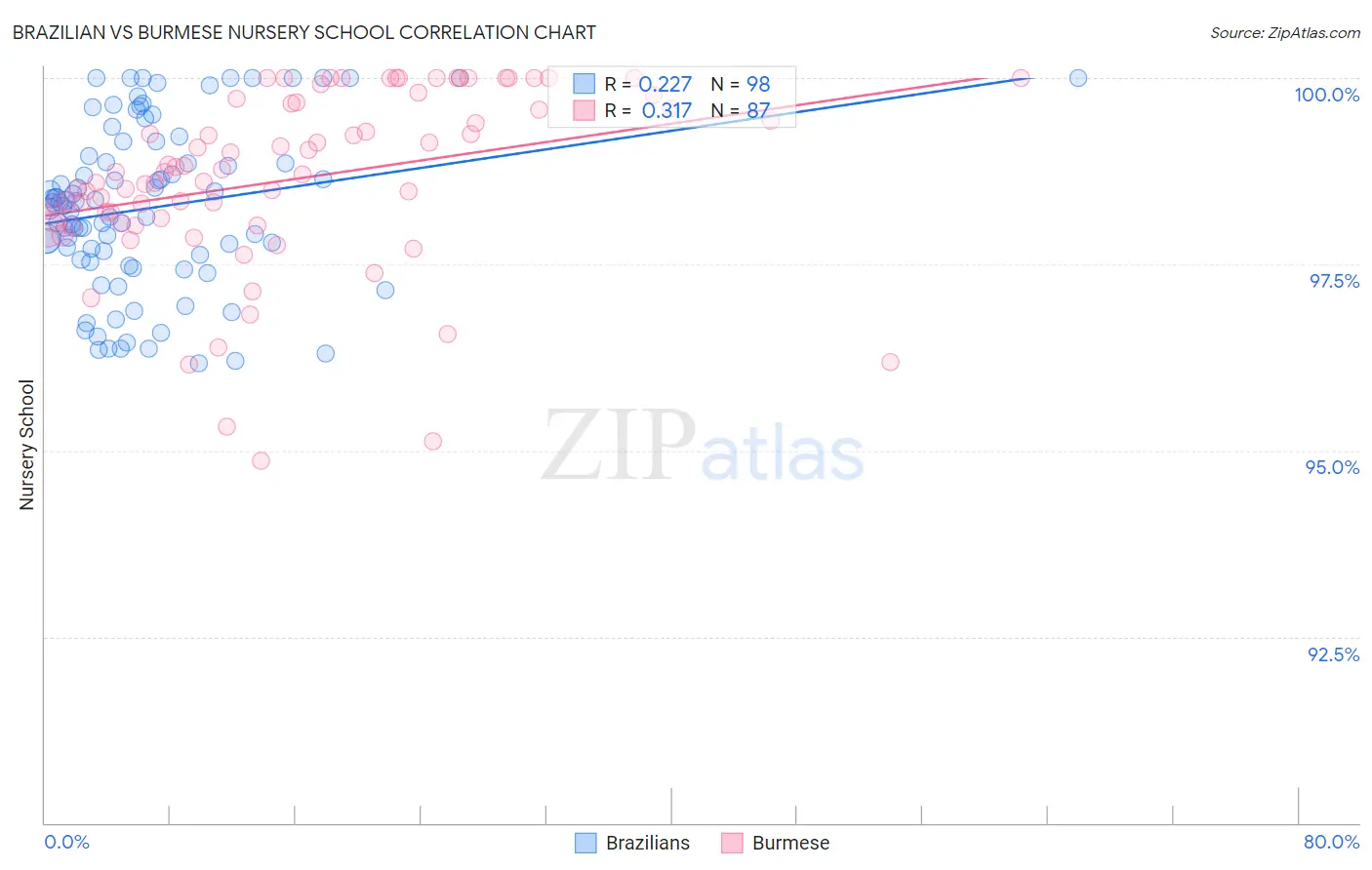Brazilian vs Burmese Nursery School
COMPARE
Brazilian
Burmese
Nursery School
Nursery School Comparison
Brazilians
Burmese
98.0%
NURSERY SCHOOL
59.4/ 100
METRIC RATING
162nd/ 347
METRIC RANK
98.1%
NURSERY SCHOOL
81.7/ 100
METRIC RATING
142nd/ 347
METRIC RANK
Brazilian vs Burmese Nursery School Correlation Chart
The statistical analysis conducted on geographies consisting of 323,863,770 people shows a weak positive correlation between the proportion of Brazilians and percentage of population with at least nursery school education in the United States with a correlation coefficient (R) of 0.227 and weighted average of 98.0%. Similarly, the statistical analysis conducted on geographies consisting of 465,408,311 people shows a mild positive correlation between the proportion of Burmese and percentage of population with at least nursery school education in the United States with a correlation coefficient (R) of 0.317 and weighted average of 98.1%, a difference of 0.080%.

Nursery School Correlation Summary
| Measurement | Brazilian | Burmese |
| Minimum | 96.2% | 94.9% |
| Maximum | 100.0% | 100.0% |
| Range | 3.8% | 5.1% |
| Mean | 98.3% | 98.6% |
| Median | 98.3% | 98.7% |
| Interquartile 25% (IQ1) | 97.6% | 98.0% |
| Interquartile 75% (IQ3) | 99.0% | 99.7% |
| Interquartile Range (IQR) | 1.4% | 1.6% |
| Standard Deviation (Sample) | 1.1% | 1.2% |
| Standard Deviation (Population) | 1.1% | 1.2% |
Demographics Similar to Brazilians and Burmese by Nursery School
In terms of nursery school, the demographic groups most similar to Brazilians are Immigrants from Russia (98.0%, a difference of 0.0%), Immigrants from Eastern Europe (98.0%, a difference of 0.0%), French American Indian (98.0%, a difference of 0.010%), Immigrants from South Central Asia (98.0%, a difference of 0.020%), and Venezuelan (98.0%, a difference of 0.020%). Similarly, the demographic groups most similar to Burmese are Marshallese (98.1%, a difference of 0.0%), Alsatian (98.1%, a difference of 0.010%), Immigrants from Israel (98.1%, a difference of 0.010%), Filipino (98.1%, a difference of 0.020%), and Hmong (98.1%, a difference of 0.030%).
| Demographics | Rating | Rank | Nursery School |
| Burmese | 81.7 /100 | #142 | Excellent 98.1% |
| Marshallese | 81.2 /100 | #143 | Excellent 98.1% |
| Alsatians | 80.3 /100 | #144 | Excellent 98.1% |
| Immigrants | Israel | 78.5 /100 | #145 | Good 98.1% |
| Filipinos | 78.5 /100 | #146 | Good 98.1% |
| Hmong | 75.7 /100 | #147 | Good 98.1% |
| Immigrants | Greece | 75.4 /100 | #148 | Good 98.1% |
| Apache | 73.2 /100 | #149 | Good 98.1% |
| Jordanians | 72.9 /100 | #150 | Good 98.1% |
| Soviet Union | 71.6 /100 | #151 | Good 98.0% |
| Dutch West Indians | 70.2 /100 | #152 | Good 98.0% |
| Immigrants | Moldova | 69.6 /100 | #153 | Good 98.0% |
| Immigrants | Iran | 68.7 /100 | #154 | Good 98.0% |
| Immigrants | South Central Asia | 66.7 /100 | #155 | Good 98.0% |
| Venezuelans | 66.6 /100 | #156 | Good 98.0% |
| Comanche | 66.0 /100 | #157 | Good 98.0% |
| Immigrants | North Macedonia | 65.7 /100 | #158 | Good 98.0% |
| French American Indians | 62.1 /100 | #159 | Good 98.0% |
| Immigrants | Russia | 59.9 /100 | #160 | Average 98.0% |
| Immigrants | Eastern Europe | 59.7 /100 | #161 | Average 98.0% |
| Brazilians | 59.4 /100 | #162 | Average 98.0% |